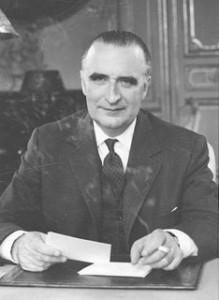Giscard d’Estaing (on the left on the picture) and Mitterrand (on the right on the picture) succeed Georges Pompidou.
V. France since 1945
B. Post-Gaullism: Pompidou, Giscard d’Estaing, and Mitterrand
→ Georges Pompidou took over from President de Gaulle (1969–1974)

Georges Pompidou
—the French elected Georges Pompidou in 1969 (58.2% of the vote against Alain Poher)
—Georges Pompidou continues the work of General de Gaulle (nuclear weapons, the balance of the Two Greatest)
—Jacques Chaban-Delmas Prime Minister proposes his “New Society” project
—Pierre Messmer was appointed Prime Minister by Pompidou
—European construction, Pompidou lifts the French veto concerning the entry of the United Kingdom into the EEC (1972 with Denmark and Ireland)
—the SFIO disappeared in 1969 and was replaced by the Socialist Party, which François Mitterrand took over in 1971
—Common program of the Socialist Party and the French Communist Party with the radicals of the left on June 27, 1972
—Death of Georges Pompidou, April 2, 1974
→ The seven-year term of Valéry Giscard d’Estaing (1974–1981)
—Valéry Giscard d’Estaing was elected with 50.8% of the vote against François Mitterrand in 1974,“You do not have a monopoly of the heart!”
—VGE supports a project of “advanced liberal society”
—economy disrupted by the two oil shocks of 1973 and 1979, mass unemployment
—nomination of Jacques Chirac as Prime Minister
—foundation of the Rassemblement pour la République (RPR) in 1976, creation of the UDF in response in 1978
—law of majority at 18 years old in 1974, Veil’s law on abortion in 1975, law on divorce by mutual consent in 1975, computer law and freedom in 1978
—resignation of Jacques Chirac in 1976 replaced by Raymond Barre, at Matignon until 1981
—the PCF (French Communist Party) of Georges Marchais separates from the socialists
→ François Mitterrand’s two terms in office (1981–1995)
First term:
—François Mitterrand was elected President of the Republic on May 10, 1981 with 51.76% of the vote against Valéry Giscard d’Estaing (setback of the PCF, of Jacques Chirac), the expression“candidate of the liabilities”
—deferred law on decentralization, abolition of the death penalty, tax on large fortunes, Auroux laws on company relations
—salary bill in June 1984, 1 million people march for private schools, Pierre Mauroy resigns on July 17, 1984, replaced by Laurent Fabius
—violence in New Caledonia, hostage taking in Lebanon
—RPR and UDF in majority, 1st cohabitation from 1986 to 1988 with Jacques Chirac appointed Prime Minister
Second term:
—Mitterrand won the election with 54% of the votes against 46% for Jacques Chirac
—legislative elections won by the socialists
—Michel Rocard Prime Minister, Matignon agreements
—he had to resign on May 14, 1991, replaced by Edith Cresson, then the Minister of Economy Pierre Bérégovoy
—ratification of the Maastricht Treaty
—the defeat of the left in the 1993 legislative elections led to the second cohabitation with Edouard Balladur as Prime Minister (relaunch of privatization from 1993, GATT trade negotiations, unemployment stabilized in 1994, failure of the Falloux law and CIP, Contract of Professional Integration)
→ 20 contemporary history cards (1945–2017)
Originally posted on 19 May 2021 @ 10:15
